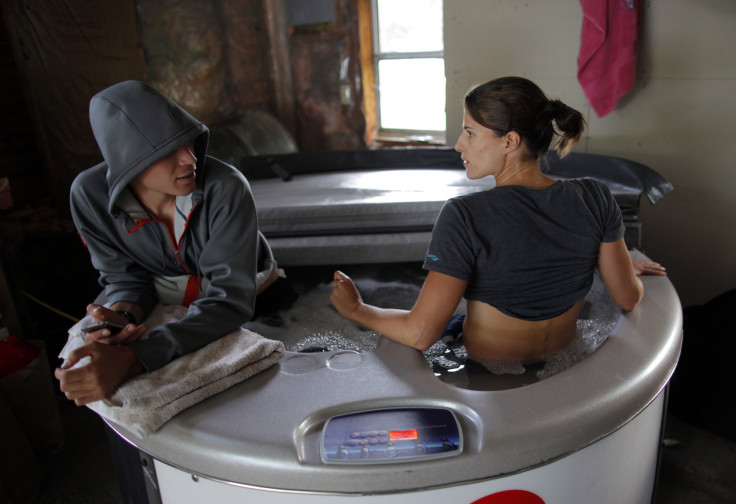Ice Baths Don't Help Athletes, New Study Shows

An age-old remedy for fatigued runners has just been put on ice.
According to a new study conducted by the University of New Hampshire, post-workout ice baths likely offer no benefits to runners, Discovery News reports.
“It doesn’t help you feel better and it doesn’t help you perform better,” said lead researcher Naomi Crystal of the University of New Hampshire in a press release. “Ice baths are very popular as a treatment, but … they’re miserable. If it doesn’t work, you don’t want to waste your time.”
Researchers studied 20 male college students who ran on a slight downhill grade for 40 minutes. The downhill grade was chosen since running downhill is known to cause muscle damage and inflammation. After they completed their run, 10 of the men were chosen to stand for 20 minutes in a recycling bin filled with thigh-level ice water. The water's temperature was 40 degrees Fahrenheit. The remaining 10 runners stood for 20 minutes in the lab following their run.
The researchers then conducted a series of tests on the men that came at intervals of 1, 6, 24, 48 and 72 hours post-run, reports Medical News Today. The tests were crafted to measure the runners' soreness, strength, swelling and inflammation using varied levels of preciseness. Some were subjective, such as asking runners to rate their level of soreness when walking down stairs. Others precisely measured the levels of proteins in the runners' blood that indicate inflammation.
Once the measurements were compiled, researchers found no differences between the two groups.
According to the researchers' paper, published in the European Journal of Applied Physiology, a minor trend toward lower inflammation levels existed in the group that took the iced bath after running. Still, the results were not statistically large enough to indicate any measurable benefits. It was also found that inflammation levels varied greatly among the runners, leaving the researchers only able to conclude that more studies must be done to pinpoint exactly what type of ice-bath treatments might offer the best results.
In a press release, Crystal added that ice baths, if helpful at all, are likely most useful in high-level, extreme athletic circumstances but are not useful for everyday athletes.
“Use them sparingly. Use them in tournament situations, use them with an athlete who has done something extraordinary,” she said. “But for day-to-day athletes, I wouldn’t recommend them. They’re painful, and they’re time consuming.”
© Copyright IBTimes 2025. All rights reserved.





















